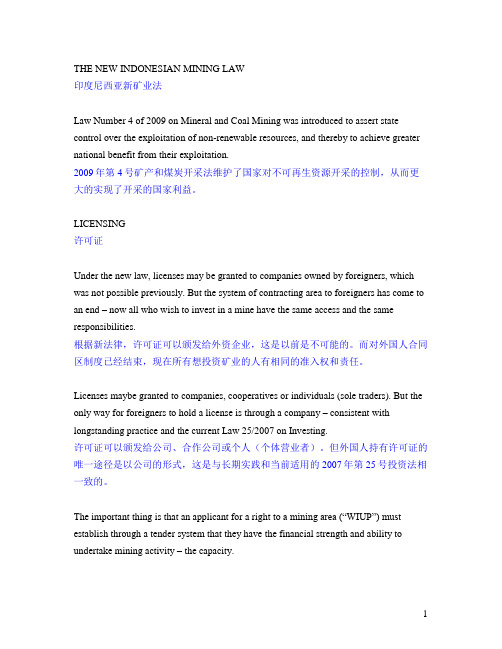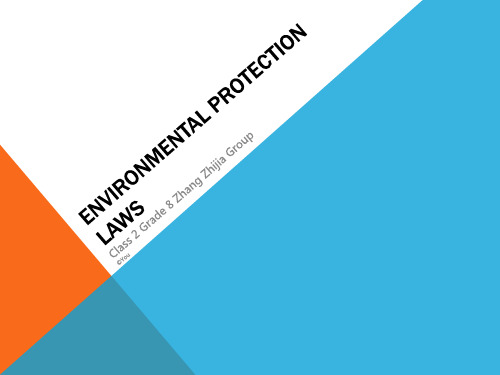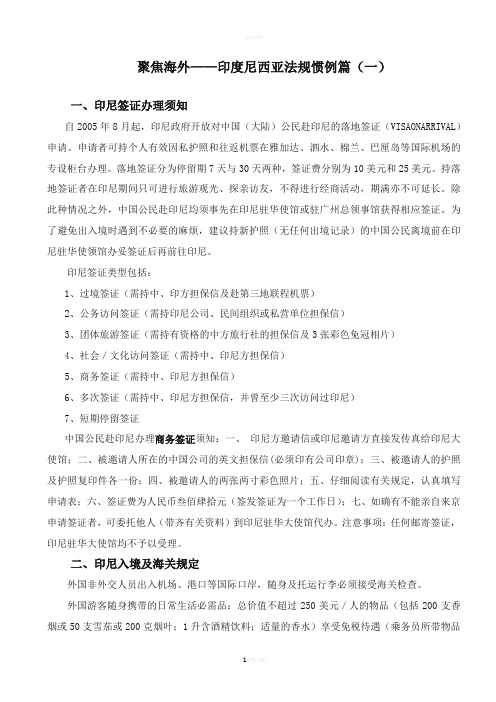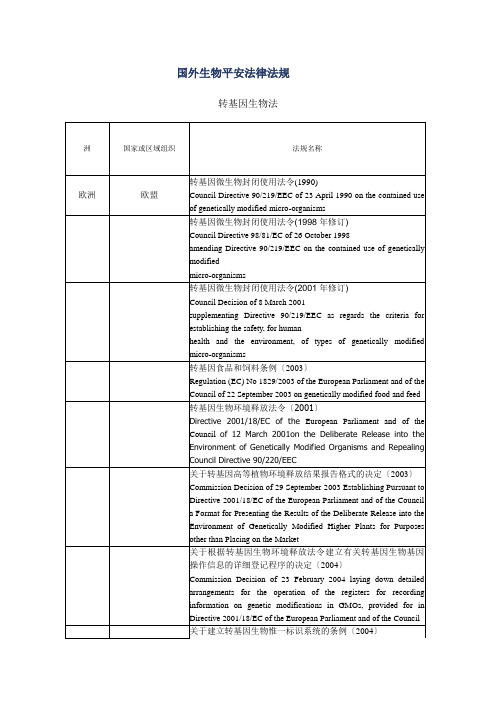印尼环境法律和法规(英文版)
印尼法律环境

印尼法律环境【概况】总的来说,印尼的法律环境并不理想。
印尼外商投资急剧下降,乃至撤资的重要原因之一,就是法律环境恶化。
外商纷纷抱怨印尼法律的不完善、不确定和不公正,中央政府缺乏有关地方自治的法律法规,新投资法的不确定性以及劳工法的不公平问题等。
为了改善投资环境,印尼对外国投资法和劳工法进行了一些有利于外国投资者的修改,并简化了审批程序。
印尼国会签署了新的劳工法,旨在为工人提供更多的合法保护,同时创造积极的投资气候,法令兼顾了劳工和雇主的利益。
此后,国会将进一步商讨新的劳资双方冲突解决的法案,以代替现行法案。
现印尼政府正在修正破产法以改善司法确定性。
如果公司重整法案正式成为法律,将是印尼被视为有司法确定性的里程碑。
【基本法律制度】1、一般法律体系及其健全程度现行宪法为《“四五”宪法》(1945年制定)。
按宪法规定,人民协商会议和人民代表会议(亦称国会)均是国家立法机构。
人民协商会议是国家最高权力机构,负责制定、修改与颁布国家宪法和大政方针。
人民代表会议行使除起草和修改宪法、制定国家大政方针之外的一般立法权。
司法机构由各类法院组成。
印尼法院分为一般法院、宗教法院、军事法院和行政法院。
所有法院不受外来因素影响,独立行使其职责。
印尼实施三权分立,立法、司法各司其职。
但是,印尼的法律体系并不健全。
例如:中央政府实行地方自治,却缺乏有关地方自治的法律法规,新投资法不确定等。
印尼现行破产法被批评为没有确定性且毫无逻辑的法律。
因为该法并没有规定必须欠多少钱才可申请破产。
劳工法则过于偏袒劳工,没有体现法律的公平性及公正性。
而且印尼国内司法腐败严重,有法不依、执法不严。
2、外资引入法律规定印尼政府对外国投资始终持欢迎态度,实行开放政策。
印尼涉及外国投资方面的法律有: 1967年第一号法律一一《外资法》1970 年第十一号法律一一《外资法》(修改版),1994 年第二十号政府令。
(1)外商投资范围1)印尼法律禁止外资或内资投资的行业或领域有:各类毒品种植及加工、酒类及酒精饮料生产、爆炸物(爆竹和烟花)生产、武器及其零部件生产、铀矿及放射性矿开采、赌场及博彩业、海绵开采、森林开发、红木加工以及被认为危害人体健康和破坏环境(有毒杀虫剂、有毒生产工艺、氟里昂制冷剂) 的行业等。
印度尼西亚新矿业法摘要翻译

THE NEW INDONESIAN MINING LAW印度尼西亚新矿业法Law Number 4 of 2009 on Mineral and Coal Mining was introduced to assert state control over the exploitation of non-renewable resources, and thereby to achieve greater national benefit from their exploitation.2009年第4号矿产和煤炭开采法维护了国家对不可再生资源开采的控制,从而更大的实现了开采的国家利益。
LICENSING许可证Under the new law, licenses may be granted to companies owned by foreigners, which was not possible previously. But the system of contracting area to foreigners has come to an end – now all who wish to invest in a mine have the same access and the same responsibilities.根据新法律,许可证可以颁发给外资企业,这是以前是不可能的。
而对外国人合同区制度已经结束,现在所有想投资矿业的人有相同的准入权和责任。
Licenses maybe granted to companies, cooperatives or individuals (sole traders). But the only way for foreigners to hold a license is through a company – consistent with longstanding practice and the current Law 25/2007 on Investing.许可证可以颁发给公司、合作公司或个人(个体营业者)。
Environmental protection laws(保护环境的法律 全英文)

CHINA'S MAIN ENVIRONMENTAL LAWS AND REGULATIONS
The People's Republic of China Marine Environment Protection Law: • • • Supervision and management of the marine environment; Marine ecology protection provisions; Prevent land pollution sources, coastal construction projects, marine construction, dumping of waste, shipping and related activities on the marine environment pollution damage
CHINA'S MAIN ENVIRONMENTAL LAWS AND REGULATIONS
The People's Republic of China Law on radioactive pollution prevention and control: • • • • • Supervision and control of radioactive pollution; Nuclear facility radioactive pollution prevention and control; Nuclear technology using radioactive pollution prevention and control; Exploitation and utilization of uranium deposits and mines associated with radioactivity radioactive pollution prevention and control; Radioactive waste management;
印尼法规惯例(一)

聚焦海外——印度尼西亚法规惯例篇(一)一、印尼签证办理须知自2005年8月起,印尼政府开放对中国(大陆)公民赴印尼的落地签证(VISAONARRIVAL)申请。
申请者可持个人有效因私护照和往返机票在雅加达、泗水、棉兰、巴厘岛等国际机场的专设柜台办理。
落地签证分为停留期7天与30天两种,签证费分别为10美元和25美元。
持落地签证者在印尼期间只可进行旅游观光、探亲访友,不得进行经商活动,期满亦不可延长。
除此种情况之外,中国公民赴印尼均须事先在印尼驻华使馆或驻广州总领事馆获得相应签证。
为了避免出入境时遇到不必要的麻烦,建议持新护照(无任何出境记录)的中国公民离境前在印尼驻华使领馆办妥签证后再前往印尼。
印尼签证类型包括:1、过境签证(需持中、印方担保信及赴第三地联程机票)2、公务访问签证(需持印尼公司、民间组织或私营单位担保信)3、团体旅游签证(需持有资格的中方旅行社的担保信及3张彩色免冠相片)4、社会/文化访问签证(需持中、印尼方担保信)5、商务签证(需持中、印尼方担保信)6、多次签证(需持中、印尼方担保信,并曾至少三次访问过印尼)7、短期停留签证中国公民赴印尼办理商务签证须知:一、印尼方邀请信或印尼邀请方直接发传真给印尼大使馆;二、被邀请人所在的中国公司的英文担保信(必须印有公司印章);三、被邀请人的护照及护照复印件各一份;四、被邀请人的两张两寸彩色照片;五、仔细阅读有关规定,认真填写申请表;六、签证费为人民币叁佰肆拾元(签发签证为一个工作日);七、如确有不能亲自来京申请签证者,可委托他人(带齐有关资料)到印尼驻华大使馆代办。
注意事项:任何邮寄签证,印尼驻华大使馆均不予以受理。
二、印尼入境及海关规定外国非外交人员出入机场、港口等国际口岸,随身及托运行李必须接受海关检查。
外国游客随身携带的日常生活必需品:总价值不超过250美元/人的物品(包括200支香烟或50支雪茄或200克烟叶;1升含酒精饮料;适量的香水)享受免税待遇(乘务员所带物品总价值不超过50美元/人),外国游客自用的照相机、摄像机、卡带式录音机、望远镜、运动器械、笔记本电脑、手机或其它类似设备需申报,离境时须带回。
印度尼西亚环保措施

印度尼西亚环保措施印度尼西亚是一个以自然环境为主要资源的国家,但由于工业化的加快和人口增长,其环境问题已经成为了一件难以回避的问题。
为了改善和保护自然环境,印度尼西亚政府制定了一系列的环保措施。
国家法规制度为了保护环境,印度尼西亚政府制定了一系列环境保护法律,其中最重要的是《环境管理法》。
该法律规定了污染物排放的标准和环境保护的要求,对环境犯罪者进行处罚。
此外,印度尼西亚还颁布了其他相关法律,如《自然资源保护法》、《森林保护法》等。
环境监测与污染治理印度尼西亚政府设立了环境监测系统,建立了定期的环境报告制度。
政府还致力于治理环境污染,建设了若干废水处理厂、垃圾填埋场等环保设施。
此外,印度尼西亚在城市地区启动了一项名为“清洁城市计划”的行动,这是一项全面的城市环境改善计划,旨在解决城市环境中存在的问题。
绿色能源和可再生能源由于印度尼西亚是一个高度依赖化石燃料的国家,为了减少对环境的影响,印度尼西亚政府着眼于开发绿色能源和可再生能源。
政府建立了法规和政策,鼓励私人和公共机构使用太阳能、风能、水能等可再生能源。
生态旅游印度尼西亚的自然环境得天独厚,政府致力于保护这些自然资源并鼓励发展生态旅游业。
政府加强对旅游业的规范,限制对敏感自然环境的影响。
政府还建设和维护生态旅游基础设施和保护设施等。
人口控制印度尼西亚是世界上人口增长最快的国家之一,为了缓解人口对环境造成的负面影响,印度尼西亚改革人口政策,推广计划生育,并且通过宣传普及教育和改善女性的地位和社会利益来推动人口控制。
总结印度尼西亚政府正在采取一系列的环保措施,以保护自然环境和人类健康。
但问题仍然存在,如物质浪费、生态破坏等问题,需要全社会的努力和行动,只有共同努力才能达到环境保护的目标。
国外生物安全法律法规

Act of January 22, 2004 on the use of genetically modified organisms and genetic products
爱尔兰
转基因生物封闭使用条例
Genetically Modified Organisms (Contained Use) Regulations (2001)
古巴
生物平安法
Decree Law No. 190 of Biological Safety
墨西哥
墨西哥生物平安法
转基因生物越境转移条例〔2003〕
Regulation (EC) No 1946/2003 of the European Parliament and of the Council of 15 July 2003 on Transboundary Movements of Genetically Modified Organisms
有害生物控制产品法
Pest Control Products Act
植物保护法
Plant Protection Act
种子法
Seeds Regulations
由生物技术开发的兽用生物制品条例
Guidelines for the Regulation of Veterinary Biologics produced by Biotechnology
新异植物及其产品进口许可要求
Import Permit Requirements for Plants With Novel Traits (Including Transgenic Plants), and Their Products
印尼投资及制药行业法律法规政策概要

印尼投资及制药行业法律法规政策概要印尼办事处前言:印尼实施立法、司法和行政三权分立,法律制度以罗马—荷兰法为基础,与当地习惯法和伊斯兰法相融合,属于大陆法系。
《“四五”宪法》(1945 Constitution (Undang—Undang Dasar 1945))、人协决议(MPR Resolution (Ketetapan MPR)、国会法律(Law (Undang—undang)、政府法令(Government Regulation Substituting a Law (Peraturan Pemerintah Pengganti Undang—undang))、政府规章(Government Regulation (Peraturan Pemerintah))、总统令(Presidential Decree (Keputusan Presiden))、地方规章(Regional Regulation (Peraturan Daerah))等共同构成其法律体系.印尼法律体系纷繁复杂,法律条例和司法判例浩如烟海.为便于快速、全面掌握印尼投资及制药行业法律法规政策,本概要通过问题导向以问答形式简要提炼其中的重点,希望有助于整体了解相关的法律和政策要求。
概要中也简单介绍了印尼三有公司和云南滇虹药业曾开展的设立合资公司的部分信息,仅做参考,该项目后因拜尔收购滇虹后终止。
第一、外资投资主管的政府部门及对外商投资项目的管理方式是?涉及的法律有哪些?符合其政策要求的投资项目审批过程大致是?一、印度尼西亚外资投资主管部门是投资协调委员会(或投资统筹机构),Badan Koordinasi Penanaman Modal,简称BKPM,是印尼经济统筹部属下政府机构.它属于印尼政府的官方机构,负责引进、协调和审批全印尼的海外投资项目。
目前印尼政府对投资的管理通过投资清单管理的形式实现,即政府分别制定《鼓励类投资项目清单》、《限制类投资项目清单》、《负面投资(不得投资)类项目清单》。
印尼法律须知

印尼投资贸易法律法规概要第一部分印尼法律环境概述 (2)第二部分印尼设立内资企业外商投资企业的相关法律政策 (3)一、投资主管机构 (3)二、设立内资企业和外资企业的程序 (4)三、关于申请人批准有限责任公司章程的步骤 (6)四、关于申请纳税人注册号 (7)五、海关的批准步骤 (7)六、限制进口许可证(APIT)的批准步骤 (8)七、公司所在地的批准步骤 (8)八、工程施工准字的批准步骤 (8)九、土地所有权的批准步骤 (9)十、损害许可准字的批准步骤 (9)十一、永久经营许可证的批准步骤 (9)十二、投资计划变动的批准程序 (10)第三部分印尼内外资企业的优惠政策 (11)一、进口税务 (11)二、税收 (11)三、产品出口 (11)四、保税区 (11)五、综合经济发展区(KAPET) (12)第四部分印尼国内纠纷解决制度 (12)一、司法程序 (12)二、仲裁和备选纠纷解决(ADR)制度 (13)三、劳动争议解决程序 (15)第五部分印尼投资相关法律解读 (18)一、解读印度尼西亚之新《矿产和煤炭矿业法》 (18)三、印尼税法概述 (24)一、外资有限公司(PTPMA)和常设机构(PE) (24)二、印尼的主要税种简介 (25)三、需要注意的几点: (27)四、印尼2003年劳动法部分规定 (27)一、印尼劳动法简介 (27)二、个别释意: (36)第五部分印尼贸易投资注意事项 (38)一、适应法律环境的复杂性 (38)二、做好企业注册的充分准备 (38)三、适当调整优惠政策期望值 (38)四、充分核算税赋成本 (38)五、有效控制工资成本 (38)六、贸易方面 (39)七、注意合作伙伴和中介问题 (39)八、其他注意事项 (39)第一部分印尼法律环境概述印尼的法律和法律制度的发展深受欧洲大陆法系特别是荷兰法律的影响,但印尼没有建立统一的法律体系,其法律文化呈现多元化的特点。
法律渊源主要包括习惯法、伊斯兰教法和荷兰殖民时期的法律和法令以及独立以后印尼制定的法律法规。
- 1、下载文档前请自行甄别文档内容的完整性,平台不提供额外的编辑、内容补充、找答案等附加服务。
- 2、"仅部分预览"的文档,不可在线预览部分如存在完整性等问题,可反馈申请退款(可完整预览的文档不适用该条件!)。
- 3、如文档侵犯您的权益,请联系客服反馈,我们会尽快为您处理(人工客服工作时间:9:00-18:30)。
AMCHAM INDONESIAWorld Trade Center, 11th FloorJl. Jendral Sudirman Kav. 29-31, Jakarta 12920, IndonesiaTel: (62-21) 526-2860 Fax: (62-21) 526-2861Email: info@amcham.or.id Website: www.amcham.or.idClarification Brief/Working PaperEnvironmental Laws and RegulationsIssue SummaryProducing and distributing goods and services in an environmentally responsible manner is the primary objective of U.S. companies operating in Indonesia. American companies have a track record in effectively operating in complex and diverse regulatory environments and take pride in such leadership roles. Over the last 18 months, the Indonesian parliament has enacted several laws that impact how companies’ environmental performance shall be characterized, monitored and managed by regulatory bodies at the national, provincial and municipal levels. These laws, although good in their intent, raise a number of questions regarding their interpretation and implementation.The passing of Law 32/2009 (Environmental Protection and Management) and Law 18/2008 (Municipal Waste Management Act) brings about a number of implementing regulations, which are expected to provide guidance and clarity. This Clarification Brief/Working Paper (CB/WP) seeks clarification on the timing and format of consultation related to implementing regulations for Laws 32/2009 and 18/2008. More importantly, this CB/WP suggests clarification points to be inserted into such consultations, so key stakeholders engage in fruitful discussions that contribute to a greater understanding of and compliance with the law.Since AmCham represents a broad scope of industry sectors, the organization looks forward to the opportunity for engagement to ensure stakeholder concerns are considered.ObjectiveIn an effort to find a balance between environmental and social responsibility, economic development and operational efficiency, and under the provisions set forth by Law 32/2009 and Law 18/2008, AmCham seeks to work with the Indonesian government and other key stakeholders to develop a set of implementing regulations that support the intent of these laws within proposed guiding principles and objectives. Ultimately, AmCham seeks to contribute to regulations that promote clarity, transparency, consistency, efficiency and competitiveness.PositionAmCham expresses the following concerns and hopes to work closely with relevant government authorities to address these concerns during development of the respective implementing regulations:Environmental Protection and Management No. 32/2009Transition and Coordination•Firms operating without AMDAL will require an environmental audit within two years of the regulation’s passage, October 2009. Firms operating without a UKL-UPL shall formulate an environmental management document within two years of the passage of the Law. (Environment Law No. 32/2009 Article 121) Guidance is needed to clarify applicability, type of audit, the process for conducting audits and to what standard those audits will be carried. (Environment Law No. 32/2009 Paragraph 12)•Companies are now required to work within the framework of the Environmental Management Protection Plan (Rencana Perlindungan dan Pengelolaan Lingkungan Hidup) (Environment Law No. 32/2009 Article 12) and Strategic Environmental Impact Assessment (Kajian Lingkungan Hidup Strategis) (Environment Law No. 32/2009 Articles 15-17). These mechanisms, critical to regulatory and planning context of the Law, have yet to be defined. Given the operational experience of its members, AmCham would be interested in providing inputs (sharing insights and best practices) to the KLHS and RPPLH, particularly related to the analyses of environmental carrying capacity, methodologies for impact assessment, climate change impact and use of natural resources. (Environment Law No. 32/2009 Article 18)•Recognizing that Regulation of the State Minister of Environment 11/2006 requires firms conducting activities with significant impacts to conduct an AMDAL, and recognizing that Environment Law 32/2009 Article 23 indicates criteria for significance, it remains unclear if additional business activities will require audits. Clarification of which parties are qualified to perform the audits is also requested.•Ministry of Environment (MOE), other Ministries and local government must coordinate closely to oversee overlapping regulations, for example in connection with monitoring of the Environmental Law compliance in the oil and gas mining activities which lies with the Ministry of Energy and Mineral Resources, rather than the MOE (Article 41 of Law No. 22 of 2001 Regarding Oil and Gas). Oversight of this complex regulatory environment is especially important given the strong enforcement mechanism in Law 32/2009.•Clarification on ways Government plans to manage and enforce all related permits by both business and the government is needed to help facilitate and ensure compliance. The enforcement mechanism of the law relies on regional civil servants to interpret the law without the technical skills to fully understand environmental quality and the legal aspects of the regulations. The law does not indicate how compliance patterns will be monitored and how the health impact of chronic or acute non-compliance will be used to trigger action.•Clarification is requested regarding the provisions whereby all existing environmental management licenses shall be integrated into an environmental permit, specifically whether all existing licenses will be replaced by the environmental permit. (Environment Law No. 32/2009 Article 123)•Clarification on the coordination between MOE and the Minister of Communication with respect to the transportation of hazardous and toxic waste is required. (Environment Law No. 32/2009 Article 59)Environmental Permits•Requiring issuance of environmental permits prior to obtaining a business license will cause costly delays in establishing a business in Indonesia. Environmental permits become a “Super License” as no business permit can be issued without it. AmCham requests clarification on how compliance management will be implemented. The process of obtaining and revoking environmental permits is of concern given the consequence is denial or revocation of the business permit. It could mean that operation and production activities of a company can be shut down once it loses its environmental permit. Further, given the strengthened role of the AMDAL in the business licensing, AmCham would be interested in further understanding how permit conditions (RKL/RPL) will be monitored and managed.(Environment Law No. 32/2009 Articles 37 and 40)•Environmental permits should be issued automatically following AMDAL approval. AmCham recommends a single Government agency issue both the AMDAL approval and environmental permit concurrently. It is likely that the processes for issuing both will be similar and hence, redundant. Waiting for AMDAL approval to begin the process of issuing an environmental permit will make the process unnecessarily long and costly. (Environment Law No. 32/2009 Article 36)•It is unclear how firms currently operating will be impacted by the new requirement for obtaining environmental permits prior to obtaining a business license. Clarification is required as to whether a grandfather clause will be included in the implementing regulations or existing companies will be subject to the new requirement. If existing companies will not be grandfathered-in, AmCham requests guidance on the renewal and timing of existing business licenses. (Environment Law No. 32/2009 Article 40)•Clarification is required on the issuance of environmental permits for projects requiring multiple-levels of AMDAL (UKL-UPL) approval, specifically after which approval stage environmental permits can be issued.•Clarification of the environmental risk analysis component, which appears to overlap with the AMDAL, is requested. (Environment Law No. 32/2009 Article 47)Industry Responsibility in Managing Environmental Quality•Clarification on the environmental reserve requirement is necessary, specifically, identification of scope of remediation, characterization of costs assumed by firms, time period for payment, and the process for effectively establishing reserves. Additionally, the rights of industry in establishing and using funds earmarked for environmental damage or restoration purposes must be explained, specifically determining the amount of funds to be earmarked, addressing financial losses due to opportunity cost and diminishing value of earmarked funds, and avoiding third party abuse when restoring environmental function. (Environment Law No. 32/2009 Article 55)•Transparency and security of funds while under government management must be elucidated.Clarification is requested to address concerns over the present value of money, specifically accrual of interest, and mechanisms for Government management of resources, including those funds that ultimately are unused. (Environment Law No. 32/2009 Article 55)•Clarification is requested on whether funds spent to meet “Environmental and Social Responsibility” requirements are tax deductible. (Law of the Republic of Indonesia Number 40/2007 concerning Limited Liability Companies Article 74)•Clarification is requested on the guarantee fund for environmental restoration which appears to overlap with the provisions regarding the reclamation and post-mining guarantees under the mining laws. (Environment Law No. 32/2009 Article 55)•Clarification is requested on the guarantee fund for environmental restoration since there is potential for “double charge” with the platform decommissioning fund or Asset Retirement Obligation which is stipulated under the Production Sharing Contract for upstream oil and gas businesses. It could also potentially increase the cost recovery. (Environment Law No. 32/2009 Article 55)•Clarification is needed on the range of risks and associated thresholds in terms of assessment, management, monitoring, and communication. (Environment Law No. 32/2009 Article 47)•Clarification is needed on industry’s responsibility to safeguard environmental quality and to provide environmental data in an accurate and timely fashion. (Environment Law No. 32/2009 Article 68)• A clause to address “abnormal” and “emergency” conditions that may cause the environmental quality standards or effluent/emission standards to be exceeded is required. In the absence of such guidance from the implementing regulations, the “abnormal” or “emergency” condition could be perceived as environmental pollution based on the definition of Environmental Pollution in Environment Law No 32/2009 Article 1.•The determination of environmental standards is crucial. The existing MOE’s environmental standards do not distinguish new facilities from those in operation prior to the new standards.Existing facilities were designed and constructed based on previous standards and are not capable of meeting the new standards immediately. As with environmental permits, clarification is required as to whether a grandfather clause will be included in the implementing regulations on new environmental standards. If existing companies will not be grandfathered-in, AmCham requests a grace period (transition period) of a few years be granted to allow firms to upgrade facilities to comply with the new standards. Without this allowance, considerable parts of the extractive industries (mining, oil & gas, manufacturing, etc.) will have to be shut down. Such an event would significantly impact the country’s economy and the income of many people.(Environment Law No. 32/2009 Article 20)•It is suggested the implementing regulations clarify that discharge and effluent standards be based on the environmental carrying capacity of the receiving media (Ministry of Environment Regulation No 4/2007 concerning Effluent Standards for Oil and Gas and Geothermal), instead of applying the same environmental standards regardless of the environmental carrying capacity.Additionally, discharge permit conditions (Ministry of Environment Decree No 12/2006) should be based on scientific study (modeling/assessment). (Environment Law No. 32/2009 Article 20)•It is advised to set up an implementing regulation (guidelines) for dumping permits. The issues in the oil and gas industry include, but are not limited to, the dumping of drilling mud and cuttings, produced sand and hydrostatic water. Specifically for drilling mud and cuttings, it is recommended that the Ministry of Energy and Mineral Resources Decree No 45/2006 be used asreference in the absence of guidelines for dumping permits from the Ministry of Environment.(Environment Law No. 32/2009 Articles 60-61)•With regards to environmental quality standards, AmCham recommends establishing a mechanism whereby entities can apply for variance to the standard if justifiable and supported bya thorough scientific study. (Environment Law No. 32/2009 Article 20)Enforcement and Litigation•Clarification is requested regarding legal protections for individuals and organizations that report and press charges against a firm accused of violating environmental regulations. There is concern that the law eliminates personal accountability and allows parties to intentionally threaten a company without justification due to the prohibition of a mechanism for retribution, namely the ability of firms to respond through criminal or civil suit in a court of law. (Environment Law No 32/2009 Article 67)•Recognizing increased cooperation between civil servant investigators and police, there remain concerns with the extended authority of civil servants to conduct investigations and arrest and detain offenders. The government is requested to clarify its role in enforcing the law when investigating allegations from organizations and the public. (Environment Law No. 32/2009 Article 94)•Clarification is needed on the public right to sue - in particular, in the context and definition of empowerment, enforcement and material loss or other types of claims including the community’s objection to the AMDAL document [Article 26(4)] and the judicial process and jurisdiction.(Environment Law No. 32/2009 Article 92)Municipal Waste Management Act No. 18/2008•Regarding new labeling requirements, guidance is needed on labeling standards (e.g the scope of information to include) and applicability of labeling requirements, specifically the type of good to be labeled and source (e.g. domestic versus import). (Municipal Waste Management Act No.18/2008 Article 14)•Clarification is required on producer obligations to manage non-biodegradable packaging and products. Items to address include the range of packaging and products affected by the requirement, limits to the length of firm responsibility for packaging and products, and elaboration on management processes. (Municipal Waste Management Act No. 18/2008 Article15)•Requirements for recycling or processing waste and by-products are vague. Waste management companies and agricultural producers need direction on how to process wastes from their operations as well as clarification on what types of waste are regulated. There is some concern that the definition of waste is too narrow.(Municipal Waste Management Act No. 18/2008)•Financial incentives should be considered in order to encourage municipal waste companies to adapt new and clean technology rather than require composting through new regulations.Regulatory requirements to compost waste remove the possibility of financial incentives such as carbon credits. (Municipal Waste Management Act No. 18/2008)。
